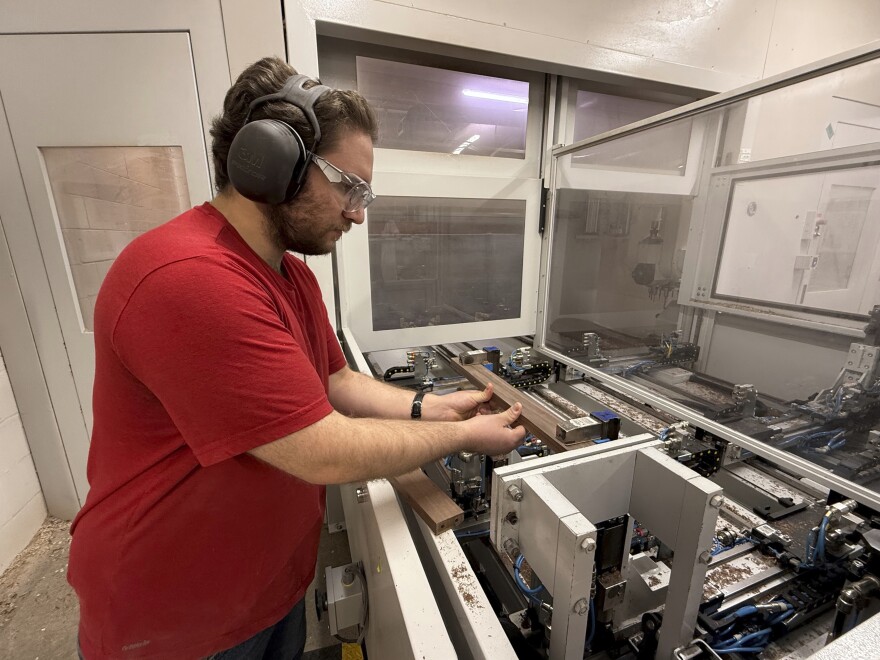Business owners, consumers and elected officials are bracing for the impact of new tariffs that will cost Vermonters an estimated $1 billion a year, according to State Treasurer Mike Pieciak.
President Donald Trump on Wednesday announced new tariffs on foreign goods in some of Vermont’s biggest export markets, such as China, India and Trinidad and Tobago.
Pieciak said Thursday that the seismic shift in trade policy will, according to one economic report, cost the average Vermont household about $3,800 annually.
“Trump’s so-called ‘Liberation Day’ is supposed to free American from imported goods,” Pieciak said in a statement. “But in reality, it’s just freeing Vermonters from their hard-earned money and hitting low-income individuals the hardest.”
The estimated $1 billion in direct costs to consumers does not include the potential economic losses to businesses that buy and sell goods and materials in foreign markets. Bill Sargent, who’s been in the forest products industry for more than 50 years, said many timber sellers were blocked from selling to China last month in response to changes in U.S. trade policy.
Sargent, a Shaftsbury resident who owns Hollow Hill Forestry Log and Timber Marketing, had found a new buyer in Vietnam. But he said the 46% tariff that Trump has now imposed on exports from that country could lead to a retaliatory strike on timber from Vermont.
“It used to be very, very simple. When I got out of school, every little town in the state of Vermont had a sawmill, and the lumber was marketed very locally,” Sargent told Vermont Public on Thursday. “And that’s not the case anymore … We market logs all over the world.”
Megan Sullivan, vice president of government affairs for the Vermont Chamber of Commerce, said Vermont businesses exported $1.9 billion worth of goods into the global market in 2024. The tariffs announced by Trump this week, she said, threaten to shrink access to those foreign markets.
“And exports are critical for the economy, right? This is where we’re sending products out and bringing money in,” Sullivan said. “That is a huge benefit to the economy when we are bringing money in from outside the state of Vermont. That is how the state runs.”
The start and stop that’s been going on with tariffs has been incredibly challenging for businesses being able to make those informed decisions.Megan Sullivan, Vermont Chamber of Commerce
Sullivan said the latest developments will do little to ease the uncertainty that was already affecting business operations in Vermont in advance of Trump’s announcement. Companies that do business outside the U.S., she said, still have no idea how countries targeted with new tariffs will respond.
“When you’re planning your production, when you’re planning what your business growth or new industries you want to move into are going to be, you need to have economic certainty,” she said. “And the start and stop that’s been going on with tariffs has been incredibly challenging for businesses being able to make those informed decisions.”
Republican Gov. Phil Scott on Wednesday called Trump’s tariff policy “counterintuitive.”
“We obviously have a right to defend ourselves in some respects in a trade situation, a trade war. But we started this one,” Scott said. “I think his rhetoric is hurting our economy at this point. Maybe in time we’ll see the merits of all this, but it’s hard to see that at this point.”

Dave Laforce, the CEO of Built by Newport, a second-generation family-owned business in Orleans County that specializes in high-end furniture, said his company hasn’t seen any hit to its bottom line yet.
“But it’s inevitable. It’s going to happen,” Laforce said. “The biggest thing is the just the uncertainty of all of it. It’s very difficult to plan anything because we really don’t know what’s going to happen, which is extremely frustrating.”
Laforce said the drawer slides he sources from outside the U.S., for example, might contain different components from different countries with different tariffs.
“All of those layers have potential different tariffs, so everybody’s trying to figure out, OK, what’s the new price going to be? Which in business makes it very difficult,” he said. “It’s hard enough to run a business, but then to have all these distractions makes it even harder.”





